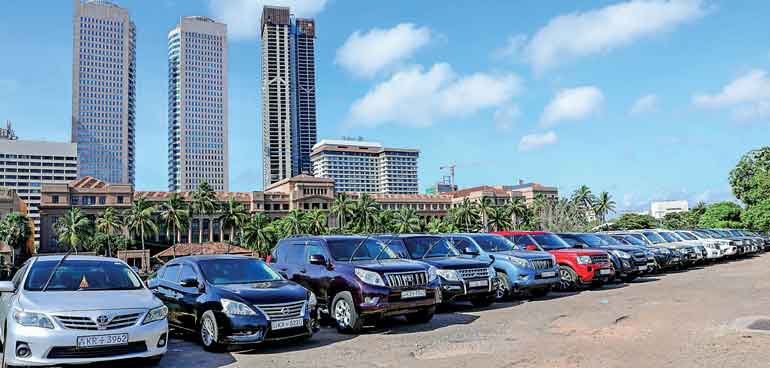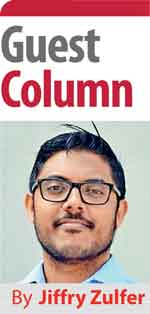Monday Feb 16, 2026
Monday Feb 16, 2026
Friday, 1 November 2024 00:20 - - {{hitsCtrl.values.hits}}

Some of the luxury vehicles used by previous administrations parked in Colombo – File photo
 President Anura Kumara Dissanayake recently made an announcement on LinkedIn which said, “Advised to allocate luxury vehicles by previous administrations to essential services.” It seems there is a huge question and dilemma as to what needs to be done with these white elephant vehicles, which are high maintenance assets the Government is currently burdened with.
President Anura Kumara Dissanayake recently made an announcement on LinkedIn which said, “Advised to allocate luxury vehicles by previous administrations to essential services.” It seems there is a huge question and dilemma as to what needs to be done with these white elephant vehicles, which are high maintenance assets the Government is currently burdened with.
There were a host of comments following the President’s post. Since the post was on LinkedIn, a cross section of professionals were seen taking part in this conversation. Someone suggested, it might be beneficial to auction some of these locally to those who can afford luxury and upkeep. The funds could then be directed toward acquiring better, more fuel-efficient vehicles, possibly even performance hybrids to help reduce emissions.
Cost-effective solutions
While most agreed that the President’s idea to put luxury vehicles used by the previous regime to good use was pragmatic, views on what should actually be done with them differed.
Commenters were of the view that the Government should opt for a more cost-effective, environmentally sound solution that would align with broader austerity measures that would demonstrate commitment to financial responsibility.
Misuse of State vehicles
One comment said while reallocating resources is one of the most effective strategies for improving public service delivery, it was crucial to establish a robust system to prevent misuse. A common example being the misuse of State owned vehicles for personal travel, such as weekend trips home. To minimise this issue, it is essential to hold the responsible officers accountable and providing common transportation options for these officials to travel to and from various destinations would help curb private use.
Be that as it may, the overriding question is how do we use the limited resources we have diligently? One of the challenges of the NPP Government is about figuring this out. It’s not only about finding the culprits that got us into this mess but finding solutions that are tailor-made for our economy.
Most often, when we look for solutions, we are tempted to travel the analogue route. The analogue mindset is all about making a small change in the input and in return you get a small change in the output. For example, if you focus only on the aspect of the luxury vehicle issue and what we can do about it, we might be missing out on the big picture which is, how do we solve our transport issues on a macro level when there’s a clamp-down on vehicle imports.
Digitalisation
The answer is Digitalisation, the process of creating exponential growth through a small change initiative that can create a massive impact on the economy. The small change initiative this writer is referring to is a policy change which will look at, not only the waste of the State sector buying luxury vehicles, but also how the misuse of vehicles is prevented, setting in place a transparent and accountable system that ensures efficient asset utilisation and drives productivity. For this, technology is a great enabler and there are already proven real world examples of digitalisation we can easily adapt without having to reinvent the wheel.
Many private sector companies now use app based taxi hailing services to manage their employees’ transport during work hours. This not only brings about zero cost in terms of vehicle maintenance, but also significantly reduces the cost per mileage. A research paper done by the Department of Manpower and Employment on “Public Resource Management,” presented at the Sectoral Oversight Committee on Energy and Transport in March 2024, brought a comparison of the cost of driving a State owned vehicle versus procuring them on rent or lease basis.
The study found that the cost of a kilometre in a State owned vehicle was between Rs. 300-500, and that it is possible to run a kilometre at Rs. 100 or less through alternatives such as rent or lease. The average per kilometre cost offered by app based ride hailing service providers is in the range of Rs. 100-150 for a car (compact to sedan), and Rs. 200-250 for a van. More economical app based hailing alternatives such as tuks can further bring down the per kilometre rate.
This is mainly because well equipped enterprise hailing solutions through apps can provide centralised controls over cost and improve asset utilisation. They can also go beyond simply hailing to add a layer of transparency and accountability with a higher level of control provided to transportation administrators in government entities.
It is all about understanding the concept of a shared economy, which digitalisation can easily bring about.
Role of a shared economy
Digitalisation goes beyond gadgets and broadband; it introduces the concept of a shared economy, where goods and services are exchanged and consumed collaboratively via online platforms. The shared economy model allows people and organisations to earn income from underutilised resources, creating new economic opportunities.
Ride-hailing services such as PickMe and Uber illustrate the power of digital platforms in driving economic growth. Through its shared economy model, it enables people to utilise idle resources — in this case, vehicles — to generate income while providing affordable transportation options to users. However, for the shared economy to truly uplift the country, more companies need to enter this space, and policy frameworks must be designed to support their growth.
Synchronisation of public and private sectors
The future of Sri Lanka’s economy lies in synchronisation — aligning the public and private sectors to move in harmony towards shared goals. Embracing digitalisation is not just an option but a necessity if the country is to overcome its current challenges and build a resilient, forward-thinking economy. The Government’s next steps will be crucial in determining whether Sri Lanka can seize this opportunity or risk falling further behind in a rapidly evolving digital world.
Let’s look at another aspect of our economy. President Anura Kumara Dissanayake has directed officials to allocate 11,000 acres of land, owned by the Kantale Sugar Company to farmers, for short-term crop cultivation. These lands are to be provided in plots not exceeding five acres each, and the President wants a proper mechanism to be developed for the process.
While looking at land allocation and factors surrounding the growing of produce there is another aspect to consider i.e. how the produce gets from farmgate to city stores. Other than the fact of wastage during transporting vegetables due to bad packing, we also lack a transparent means of figuring out how pricing is calculated, evaluated and not subject to manipulation, meaning will the farmer get a fair price for his produce? The current farmgate to city store equation is controlled by middle men operating on a very analogue approach to the mechanism. If this process is digitaliased through an app and the city stores can actually connect directly with the farmgate through a facility that allows the gig economy to do the transportation, there would be mutual benefit in terms of pricing, to the farming community and the urban populace.
State organisations like ICTA, who overlook digitalisation can spearhead such initiatives and ensure a free and fair process. This is why we need to stop thinking analogue!
In conclusion, the luxury vehicle debate is emblematic of a larger challenge. Sri Lanka must rethink its resource allocation strategies in the public sector, and more broadly, embrace digitalisation as a solution to its economic woes. Through shared economy models, robust digital infrastructure, and forward-thinking regulation, Sri Lanka can chart a course towards economic synchronisation and sustainable growth.
(The writer is a past President of the Digital Chapter of the Federation of Information Technology Industry Sri Lanka (FITIS). He is also the founder and CEO of Digital Mobility Solutions Lanka Ltd., that formed PickMe, the most successful tech-based startup which introduced online ride hailing to Sri Lanka. Zulfer won the National Silver Award at the FCCISL Sri Lankan Entrepreneur of the year 2018, the FCCISL Young Entrepreneur of the Year Award (April 2004) and the ICTA Young IT Professional Award (May 2006) for his efforts in technopreneurship.)